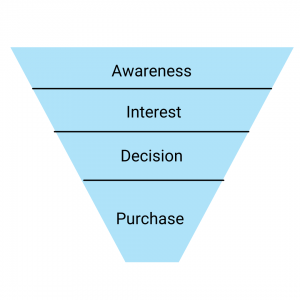We’ve already gone into the importance of goal setting, but we only touched briefly on setting the right goals for your digital marketing campaigns.
Ultimately, you want your business to be successful, and this usually means getting more sales, more clients, more work, more revenue, more profit… more of whatever it is that makes your business tick. Yeah, that’s the ultimate goal, but maybe not the right goal for your digital marketing campaign.
Why is that? Well, it depends on what your business does and its particular niche. Going straight for the sale isn’t always the best or most efficient thing when it comes to advertising your business online.
What Marketing Goals Should I Set For My Business?
Too often businesses equate marketing with sales. Yes, marketing leads to sales, but not always directly. Business owners may see the direct results of their online marketing efforts; things like social media ads, Google Ads, SEO, and more, and think “this stuff isn’t getting me sales.” But at the same time they’re seeing sales come from other channels such as sales staff and referrals. So they think Facebook ads don’t work and they never try it again.
In a case like this, one of two things (or both) are likely happening:
- The business owner isn’t recognising how their marketing efforts are complimenting their sales efforts.
- Their marketing is targeting the wrong point in the sales funnel.
And this is where you need to think about what your campaign goals should be: where in the sales funnel you should be aiming.
What’s A Sale’s Funnel?
 A sales funnel represents a buying journey from awareness, to interest, to decision, to purchase. Every sale goes along these lines, even minor ones.
A sales funnel represents a buying journey from awareness, to interest, to decision, to purchase. Every sale goes along these lines, even minor ones.
Take an example of something no one would think too long about: impulse buying a different brand of tuna at the supermarket.
- You get to the tuna section and see a new brand available (awareness).
- It’s on sale at a reduced price because it’s new (interest).
- It looks to be of similar quality to what you usually get, and you can save some money (decision).
- You throw it in your cart (purchase).
Obviously this is a very quick example, but it shows how people move through the funnel for every purchase. For a larger purchase the decision making process is longer so more information is needed. So in this way, for larger purchases users aren’t going to suddenly buy something off the back of a single Facebook ad or Google search.
Think About Where In The Sales Funnel Your Marketing Should Be Aiming
Your digital marketing needs to target the right point in the sales funnel in order to succeed. Too often business owners will only target the final sale in things social media advertising or in their website set up and they don’t see results. That’s because they’re not thinking about how their customer buys.
Is your product/service:
- New/novel – you may just need to work on awareness and interest.
- Buy now – these are often low thought retail items that don’t require a lot of research. Going straight for the sale here is a good option.
- Request a quote/request a call back – these are products where customers may be comparing you to competitors. That’s fine. Pushing too hard for the sale may put customers off. Your advertising and website language needs to acknowledge this and have less pressure.
- Research and come back – for some products customers need to do a lot of research before even thinking about talking to you. Give them the information they need so they can move through the sales funnel.
Of course you can (and should) target multiple points in the sales funnel, but it’s not always about just going for the sale. Successful marketing gives customers the tools to move through the buying process.
With This In Mind, Set Your Goals Accordingly
As you can, your goal for a specific marketing campaign doesn’t always need to be a sale or even a sales lead, maybe it’s something a little lower like a newsletter sign up, download a product catalogue, or even just a website visit.
If you have the budget, sure, target all points in the sales funnel with your paid advertising. If you don’t, at the very minimum your website should be set up to address all points in the buying journey and then you need to put your limited budget towards what is most appropriate for your given business niche. Then, depending on how you’re using this budget, define your goal from there.
As Always, Think
There’s nothing special here, but sometimes it takes a third party (like a digital marketing agency) to recognise it. We’re always more than happy to have a conversation about your specific marketing goals and give our frank and honest advice. Just let us know.





